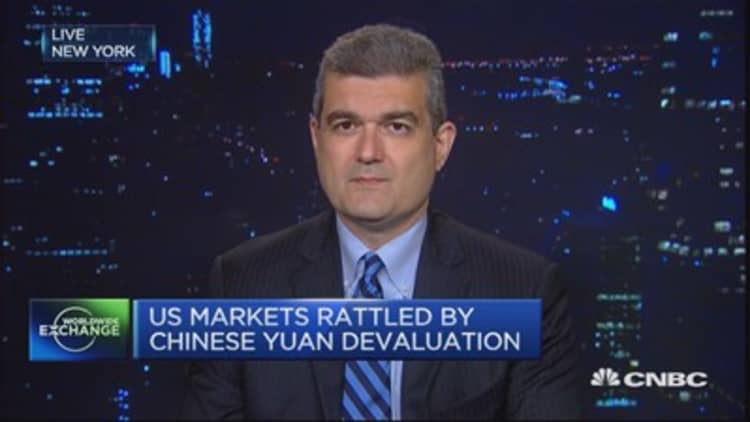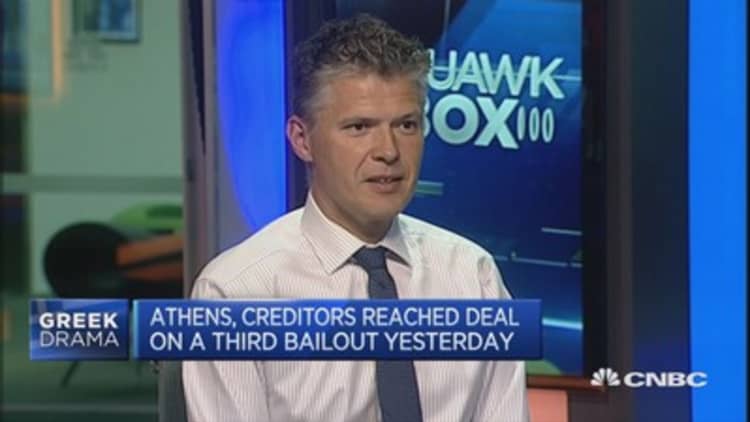Jittery investors should look to eastern Europe—and Romania in particular—for a sanctuary from Chinese market volatility and Greek debt wrangling, analysts told CNBC.
"Central Europe and Romania are all looking a little bit pretty," Charles Robertson, chief economist at emerging market-focused investment bank Renaissance Capital, told CNBC.
He said that the region was "one of those safe haven plays" at a time when investors were eager to avoid exposure to tumbling commodity prices, Chinese market interventions and uncertainty surrounding Greece's solvency and its future in the euro zone.
According to Robertson, Romania is 2015's best-performing frontier market so far, with the Bucharest Stock Exchange up 9 percent on the year.
"At a time when you do not like commodities—so people have been negative on Russia and South Africa—when you don't like the politics in Turkey, where are you ending up? You are ending up in Poland, Czech Republic, Hungary—these are countries that are not getting hit by commodities getting smacked as a result of China, they are beneficiaries," Robertson said.
Fears regarding China's economic growth trajectory, market interventions and rocky stock market ride have hit commodity prices, worsening a rout that had already seen crude oil prices halve since the middle of 2014.
The People's Bank of China sent shockwaves through international markets for a second day running on Wednesday, when it lowered the yuan's peg against the U.S. dollar still further. This follows swathes of interventions by Beijing in recent weeks aimed at stabilizing Chinese stocks, with the Shanghai Composite down around 25 percent since a peak in June.

'Run and hide' in emerging Europe
Timothy Ash, emerging market strategist at Nomura International, noted that central and eastern European countries were beneficiaries of lower oil and other commodity prices and had few trade links to China.
"Reviewing the EM (emerging market) space, places to 'run and hide' are probably in Emerging Europe—Central Europe, Baltics and Balkans," Ash said in a note distributed on Wednesday.
"Reasons to be constructive include: Generally, the region is a commodity and oil importer, and hence a big net beneficiary from lower oil/commodity prices… China trade links are limited—few of these countries export significantly to China, and there have been limited China inward investment flows."
The region has also gained from its close ties to Germany, Europe's biggest economy, said Bob Parker, senior adviser in investment, strategy and research at Credit Suisse.
Countries like Romania and Bulgaria may have been hit by their banking sectors' strong ties with Greece, but many countries in the region continue to export heavily to Germany.
"I think Central Europe is very interesting," Parker told CNBC on Wednesday.
"If you buy the argument that all the stimulus that is being thrown at the euro zone economy is boosting the German economy and if you believe, as I do, that German growth is accelerating positively through 2 percent, then you have got to invest in central Europe, which is cheap and which derives a lot of its strength from the recovery in Europe."

Bank ties remain
However, Greece remains a concern for some economists interested in the region. The country and its international lenders have finally agreed on the outline of a third bailout, but Greek and other national parliaments in the euro zone still need to approve the deal.
Capital Economics has named Serbia and Bulgaria—Greece's near-neighbors to the east—as the most vulnerable of any frontier markets to a so-called Grexit. Bank subsidiaries in Macedonia, Romania and Bulgaria retain direct financial links with Greece, with Greek-owned banks accounting for around 20 percent of Macedonia's banking sector.
"The probability of a downside scenario in which a Greek exit from the euro zone triggers a fresh slowdown across eastern Europe is on the rise," said Capital Economics in June.
In addition, Robertson said that investors looking at eastern Europe need not fear an increasingly militant Russia.
Robertson's employer, Renaissance Capital, is an investment bank that originated in Russia and is owned by Onexim Group, a Russian private investment fund.
"I suspect central Europe is seen more as a German proxy and I would hope that could be separated," said Robertson.
"We would hope not to see lots more military exercises being announced," he later added.
—By CNBC's Katy Barnato. Follow her @KatyBarnato.


